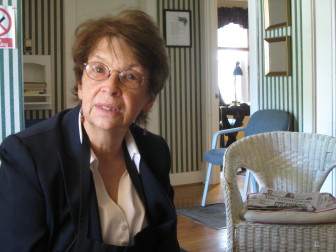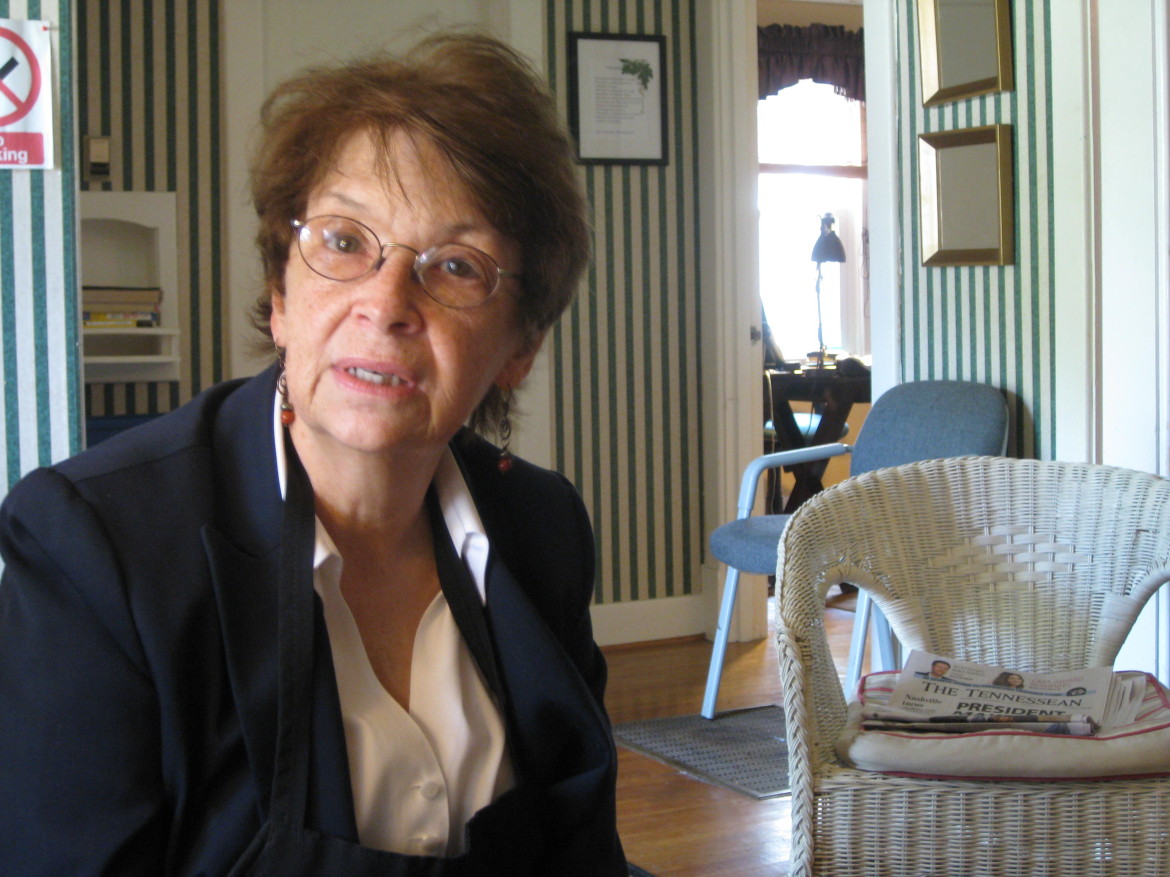
James Swift / JJIE
Carolyn McFall
[Editor's Note: To protect the privacy of the youth and their families, the names of the EDP participants in this story are fictitious.]
In an affluent yet troubled Nashville suburb, one woman employs a different kind of “tough love” for systems-involved youth.
»Click HERE to read the sidebar article on evaluating the effectiveness of evening diversion programming
FRANKLIN, Tenn. -- “These are my grandchildren,” said Carolyn McFall, 70, as she flips a spoonful of ground beef in a skillet. Tonight, she’s making her specialty, a dish she calls “hamburger pie.”
“It’s beef, and cheese and biscuits,” she explains. “All of the things teenage boys like.”
In his bright tangerine-colored tank top, high-schooler Mike mills about in the kitchen, nibbling on cookies and popping open cans of biscuit dough. At the dining room table, Elizabeth, a few weeks shy of her 18th birthday, recounts her day.
She pulls her flowery blue skirt up and scratches her ankle, revealing a monitoring device strapped to her leg. One of the reason she hates it is because it limits her wardrobe choices for classes -- skinny jeans and short skirts, Elizabeth said, are completely off limits.

Katy McCarthy / JJIE
This story is part of a series of articles exploring Community-Based Alternatives. Read more from the series here: http://bit.ly/15geZEL
Mike pours himself a glass of pink lemonade. He’s been mulling whether or not he should attend a party this weekend. Since some of his old “stoner friends” will be there, he said he thinks his dad will make him do spackling chores all Saturday instead.
He refers to his father -- perhaps affectionately, and perhaps not -- as “pissy pants.”
“He’s always grumpy,” Mike said, flipping through a stack of papers. Meanwhile, McFall retrieves a small stack of worksheets from her office, in preparation for a weekly rite known as “family night.”
The homey atmosphere of the Evening Diversion Program, operated by the non-profit My Friend’s House Family and Children’s Services, is a far cry from the grey tones, orange jumpers and confined spaces of most juvenile detention facilities. Here, young people like Mike and Elizabeth -- who in other jurisdictions, may have found themselves in residential lock-up -- are instead taught pivotal social skills, in a unique community-based alternative program designed to keep young people out of the system altogether.
A Different Kind of Intervention
McFall may not be the biological grandmother of any of the kids in My Friend’s House Family and Children’s Services Evening Diversion Program (EDP), but she said she likes to direct the program as if she were.
“I want each group to be a family,” she tells the young people in EDP. “These are your brothers and sisters, and I’m the cool grandmother.”
McFall has helmed the program for the last six years. Earlier, she worked as a private counselor, and has spent time at several large agencies.
The program operates out of a small, one-story home in a quiet, residential neighborhood close to the Franklin city limits. It stands side-by-side with My Friend’s House boys’ home, which is one of the last remaining standalone group homes in Middle Tennessee.

James Swift / JJIE
The EDP house.
The EDP site, which she refers to as “her cottage,” does not feel like just another building, McFall said. Its quaintness gives it a certain intimacy, she said, which is something that’s often lacking in larger facilities.
“The Evening Diversion Program is a program for small groups of at-risk youth,” she said. “The court wanted us to start a program that would be the last program before these kids went into state custody.”
On average, McFall said she worked with about 50 youths a year. Children involved with the EDP spend 25 hours a week at McFall’s cottage, as part of an overall program that usually lasts six weeks. She works with both boys and girls, ranging in ages from 12 to 18.
Nearly all of the children she works with are systems-involved, referred to the program via DCS, the county juvenile court or the state probation office. The intensive program, she said, is designed to keep at-risk kids off the streets during the hours they are most likely to get into trouble -- 3:30 p.m. to 8 p.m.
Initial funding for the program stemmed from a three-year Tennessee Commission on Children and Youth (TCCY) state grant, she said, while the majority of current EDP funding comes from local agency grants and partnerships with organizations like the United Way and CASA.
Excluding interns, McFall is the only staffer involved with the EDP. “There are no office politics,” she said. “It’s just the kids and me.”
The diversion program, McFall said, employs elements of more than 120 other programs. Multisystemic Therapy, Functional Family Therapy, Cognitive Behavioral Therapy; all components of her system, alongside tenets derived from sources as diverse as Lawrence Kohlberg and Dr. Phil. “Anytime something works,” she said, “it’s immediately put into place.”
Learn more about reform trends in mental health at the juvenile justice resource hub.
A Common Community Problem
While the children in EDP may end up in the program for a wide array of offenses, McFall said substance abuse appears to be a common factor among nearly all of the young people she works with.
“When they come in here, their worlds are about as big as a bong,” McFall said. “They’re not interested in anything, except their using friends and using.”
Addressing the problematic behavior of these youths, McFall said, meant addressing their substance dependencies and creating escape routes that removed them from both the drugs and acquaintances who may be using them.
“They have lost contact with what’s normal,” McFall continued. “They think they can only have fun when they’re drunk or high.” A major component of the program, she said, was helping youths identify more constructive and ambitious life goals.
In addition to drug and alcohol screenings, the EDP also entails suicide risk and other mental health assessments. Currently, she said My Friend’s House was planning on adding an inpatient-step down facility, alongside a new drug program modeled after EDP for the boys’ group home. The organization, she said, has also obtained foster home accreditation.
McFall points towards a tiny row of houses across the street from her cottage. “In a perfect world,” she said, “this whole little circle would be for mental health and child welfare.”
Regarding the success rates of the program, McFall said that while EDP may not result in an automatic turnaround in youth behavior, the impact it makes on participants are long-lasting.
“I would say that most of the kids that go through will try something one more time,” McFall said. “But nothing like they did before and usually, if they go back to court, then we don’t see them anymore.”
Helping, Not Hurting
For McFall, 12-hour days are not unusual. EDP pre-planning usually begins at noon, she said, but frequently, her workday begins even earlier. If one of her youths has a court appearance in the morning, McFall said she’s more than willing to show up beside them, even though her position doesn’t necessitate it.
“I go to court with them, every time,” she said.
Routinely, she said she visits the Williamson County Juvenile Court, not only to see if any of her former youths have re-offended, but also to scout potential EDP participants. “If I see a kid who comes through there that sounds like they’re just perfect for the program,” she said, “I’ll just go to the YSO and say, ‘hey, what about so-and-so?’”
One of the favored approaches McFall employs is what she called a “backdoor treatment plan.” She sits down with youth in the program, and allows them to chart their own plans, based on what they believe would be the best way to achieve rehabilitation. In one example, she said she asked what one youth felt he needed to do to become sober; his responses, McFall stated, ended up becoming his own blueprint for treatments.
McFall’s program seeks to instill in young offenders specific life skills, such as coping mechanisms and how to work with others to solve problems. Instead of being punitive, she said EDP is designed to educate youths on how to make better decisions and “rescue themselves.”
The goal of EDP, she said, was to “normalize” its participants. “You’re just making mistakes and you don’t know how to get out of them,” she said. “Every one of them is worth saving.”
For McFall, social skills development is a pivotal aspect of rehabilitation. To help youths better empathize with others, McFall said one of her groups once prepared dishes for a get-together with several agency members. “They see DCS, Youth Service Officers and the court officers, they’re here to punish you,” she said. By having regular social interaction with probation officers and YSOs, however, she said her kids were able to better relate to and understand systems employees. Learning how to discuss contentious issues civilly, she said, was another major component of the program.
The most difficult part of her job, McFall said, weren’t the kids, but working with their parents and custodians.
“So many of these families have given up on these kids,” McFall said. She recalled several incidents involving LGBT youths enrolled in the program.
“This is a very religious area,” she said. “And I have had any number of parents who come in here, who wants me to explain to [their children] that God doesn’t love them.”
After making a referral to Child Protective Services, McFall said she was nearly attacked by one irate guardian -- he had his fist reared back, she recollected, while 911 was being called.
Often, McFall said she would refer parents to more intensive at home therapies. Sometimes, she even said she breathalyzes some parents, whom she suspects of attending conferences under the influence.
“When I say no addictions in the family,” McFall, stated, “I mean it.”
Family Night
Elizabeth’s dad is there, with her step-mom. Her birth mother sits on the opposite side of the room. Mike’s father sits adjacent to his son. Everyone in the den is motionless.
McFall breaks the silence by asking the entire circle the same question. “What was something you once believed to be true, that you later realized was an illusion?” To start the discussion, she said that she thought her own marriage would last forever.
Mike’s father recounts a time he had to fire one of his most enthusiastic workers. He just wasn’t cut out for the job, he said. “He sucked.”
Elizabeth’s father said he used to believe in Santa Claus. His ex-wife replies that she used to believe in the Easter Bunny and the Tooth Fairy.
Elizabeth said that she used to believe it when her family told her “the world was her oyster.” Nowadays, she’s a lot less confident about her own abilities. Mike responded with a mild smirk. “I thought I’d be a stoner for the rest of my life.”
The group discusses Mike’s weekend dilemma. Should he go to a college football party, where his friends will most likely be drinking and smoking marijuana?
“All his stoner friends are going to be there,” his dad said.
“Not going is an option,” McFall responds.
“I can go to somebody else’s house and watch it,” Mike chimes in. Viewing the game, he adds, really isn’t relevant. “Watching the game sober is the problem.”
The group then discusses Elizabeth’s problem. She wants to go to a homecoming party, but her parents issue several caveats. She has to take a breathalyzer when she returns, a drug screening shortly thereafter and she has to keep her cell phone turned on the entire time. Or, her parents propose, they can have the party at their place. No one seems to think the latter is a viable option.
“Why do your parents yell at you?” McFall asked Elizabeth.
“Because of the things we do,” Elizabeth responded.
“How do you stay out of trouble?” asked McFall
“Do the right thing,” Elizabeth casually remarked.
McFall turns toward Mike.
“Why did you end up arrested?” she asked.
“Because I did bad,” Mike answers.
“They just want you to follow the rules,” McFall said. “If DCS says you’re going to do something, being pissy is not going to help.”
It’s like a poker game, McFall explained.
“Every time you do something, they do something bigger,” she said. “You can’t win.”
The “worst,” McFall said, is something the youths have already experienced, if only they would follow the rules.
“Continue to do the right thing,” she advises the circle, seemingly eying everyone in the room. “More than you have to.”
A Learning Experience
While Elizabeth and Mike wash dishes, McFall recounts an experience she had with a previous EDP group.
“From time to time, we’ll have a mother dog that will reject a puppy, or the puppy is much smaller than the other puppies,” she said. “I raise them myself, because the other puppies can damage them just by walking on them if they’re really fragile.”
She brought the puppies to the cottage, and showed them to her kids.
“It was so neat to see these boys, who were so angry and could be so bad,” she said, “holding a 4-ounce puppy like it was a piece of glass, and feeding it, and just getting so attached and raising them.”
The moment, she said, was beautiful: kids deemed “disobedient” by society at large, teaching puppies how to be obedient. She recalled another group, in which the two “thuggiest” program participants she had ever encountered helped build one of the loveliest flowerbeds she had ever seen. When a young person in the area committed suicide, she said another group banded together, and donated a tree to the family of the deceased.
Life skills-building experiences of that caliber, she said, are unlikely to occur in youth detention facilities.
“There’s a difference in being punitive and addressing the problem,” McFall said. “I’m not sure what detention does for them, except frighten them.”
Whereas her program emphasizes stress-coping techniques, social interaction and improving family situations, she wondered what kind of skills young people are acquiring in secured facilities.
McFall turned to Elizabeth, and asked her what she felt were the differences between EDP and lock-up.
She takes less than a second to reply.
“You go in with problems, and you come out with the same problems,” Elizabeth said. “You don’t learn anything in jail.”

